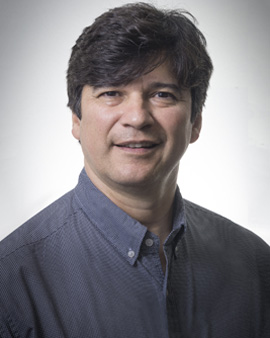Mauricio J. Reginato, PhD, Named Chair of Biochemistry & Molecular Biology
February 2, 2024
Mauricio J. Reginato, PhD, professor, has been appointed chair of the Department of Biochemistry & Molecular Biology effective February 2, 2024. Dr. Reginato was appointed interim chair of biochemistry and molecular biology in the summer of 2021, and has been a faculty member of the College of Medicine since 2004.
As interim chair, he has been successful across all missions including teaching, research and partnerships. Dr. Reginato recruited teaching faculty to create and launch a first-in-the-U.S. online MS program in Cancer Biology in the fall of 2023, increased the department’s Master of Science program revenue to over $1 million, and hired a new tenure-track research faculty member with National Institutes of Health (NIH) funding.

Dr. Reginato co-created and is the current director of the Cancer Biology MS program in the Graduate School of Biomedical Sciences and Professional Studies. He is also director of the In Vivo Animal Imaging Facility at the College of Medicine, where he provides training and oversight on IVIS animal imaging equipment to over 20 labs. Dr. Reginato serves as the program leader of the Translational Cellular Oncology program at the Sidney Kimmel Cancer Center (SKCC) Research Consortium — an NCI-Designated Cancer Center.
Dr. Reginato’s lab is focused on understanding how signaling pathways regulate metabolic reprogramming in cancer cells, particularly breast cancer, with the goal of developing novel treatment therapies. His research interests include the molecular mechanisms underlying breast cancer growth, survival and spread to distinct organs, and in particular how cancer genes alter metabolic pathways and how these pathways may be exploited to target cancers. His research is currently funded by several NIH awards, and grants from the Pennsylvania Breast Cancer Coalition and the Coulter-Drexel Translational Research Partnership.
He is the recipient of the Drexel University Pennoni Honors College’s 2022-2023 STAR Scholar Outstanding Mentor of the Year Award. He has also received College of Medicine honors including the Julian Marsh Faculty Scholar Award (2021); the Elias Abrutyn Mentoring Award (2018); Faculty Mentoring Award, MS Research Intensive Programs, Graduate Student Association (2016); and the Young Investigator Award (2010).
Dr. Reginato earned his PhD in pharmacology from the University of Pennsylvania and completed a postdoctoral fellowship in cancer biology at Harvard Medical School. He has published extensively, including articles in high-impact journals such as Nature, Cell and the Journal of Biological Chemistry. He is a member of the American Association of Cancer Research, the American Society of Cell Biology and the American Society for Biochemistry and Molecular Biology. He currently serves on the Membership Committee, the Internal Advisory Committee and the Education and Training Advisory Committee at SKCC, and the Educational Coordinating Committee at the College of Medicine. He is a Liberty Scholar Mentor at Drexel University and associate editor of Breast Cancer Research. Dr. Reginato also contributes as an ad-hoc grant reviewer for several entities, including many at the NIH, and for international organizations including the National Science Center of Poland, the Wellcome Trust DBT India Alliance Fellowship and the French National Research Agency.
The Department of Biochemistry & Molecular Biology has a long history of offering outstanding educational programs for both PhD and MS candidates, and conducting renowned research to discover the molecular basis of disease, including research focused on cancer, infectious disease and aging.
Under Dr. Reginato’s leadership, the collaborative nature of the department and the wide array of scientific approaches — from structural biology and biophysical methods to drug development, cell biology and animal studies — have fostered an innovative and prolific research and training environment.